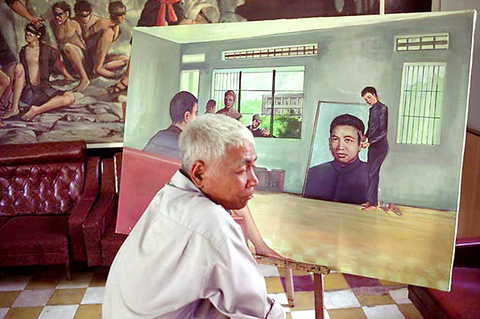When Cambodia recently staged a national film festival, serious drama was in gruesomely short supply: almost half the entries were low-budget horror flicks.
It wasn't always thus.
In the 1960s, now-retired King Norodom Sihanouk was not only the patron of a Cambodian film industry, he was one of its most active practitioners. He wrote, directed and even acted in his own high-minded if formulaic romances and tragedies.

PHOTOS COURTESY OF FOX MOVIES
More than 300 Cambodian films were made during that vibrant era, some well-received in other Asian countries.
But when the communist, puritanical Khmer Rouge regime came to power in the mid-1970s it banned all kinds of entertainment and smashed cameras and film-making equipment.
As the country's spirit began to recover from the Khmer Rouge era, and economic revival took hold in the early 1990s, the industry began to rebound. More than 100 production houses sprang up, mostly using video equipment to churn out movies on a shoestring.
But most of them collapsed because of their amateurism, and the industry is still struggling to recover its former glory.
These days, about five movie making companies have the expertise and strong finances to succeed, said Chheng Sovanna, head of the Culture Ministry's movie production office.
``Most of them are accidental producers, who just spent US$3,000 on a camera, bought some tapes, turned on the light and started shooting,'' said Chheng Sovanna, himself a director who graduated from Russia's State Institute of Cinematography. ``We don't understand the way they make movies.''
And the filmmakers lean more toward anarchy than artistry on screen.
At the recent festival, a typical movie featured a female vampire baring her canine teeth in a grin as she looked for prey. In Nieng Arp, or Lady Vampire, a flying female head with internal organs dangling beneath it chased a terrified couple in the dark.
Nine of the festival's 22 entries were in a similar vein.
``We make movies to suit the domestic market and the demand of our youths,'' said Korm Chanthy, the manager of FCI Productions, which made Nieng Arp.
``They like to watch horror movies because they make them feel excited, thrilled and terrified,'' he said.
The government wasn't impressed. The filmmakers ``injected too much hallucination and superstition'' into their work, complained Culture Minister Prince Sisowath Panara Sirivuth.
``Their understanding of moviemaking is that it's just business,'' he said. ``And they have this misperception that, without training, they can still make movies.''
The government has touted the idea of establishing a film school, but in a country so poor and reliant on foreign aid as Cambodia the idea is unlikely to get off the ground anytime soon.
Producer, 29-year-old Heng Tola, was looking to diversify his computer business when he founded Campro three years ago with several friends.
Making a movie takes Campro about three months and costs an average of US$30,000, including about US$1,000 for the lead actor, he said.
Despite the current taste for horror movies, Heng Tola believes a more serious trend is emerging, prompted in part by the resentment many Cambodians feel about its colonial past and toward domineering neighbors such as Thailand and Vietnam.
One of the festival entries was a nationalistic epic about a peasant protest against high tax imposed by Cambodia's colonial rulers, the French.
``The Cambodian movie is being reborn after a long absence. Its existence has been up and down, and the question now is how we can make it really stand,'' Heng Tola said.

This is the year that the demographic crisis will begin to impact people’s lives. This will create pressures on treatment and hiring of foreigners. Regardless of whatever technological breakthroughs happen, the real value will come from digesting and productively applying existing technologies in new and creative ways. INTRODUCING BASIC SERVICES BREAKDOWNS At some point soon, we will begin to witness a breakdown in basic services. Initially, it will be limited and sporadic, but the frequency and newsworthiness of the incidents will only continue to accelerate dramatically in the coming years. Here in central Taiwan, many basic services are severely understaffed, and

Jan. 5 to Jan. 11 Of the more than 3,000km of sugar railway that once criss-crossed central and southern Taiwan, just 16.1km remain in operation today. By the time Dafydd Fell began photographing the network in earnest in 1994, it was already well past its heyday. The system had been significantly cut back, leaving behind abandoned stations, rusting rolling stock and crumbling facilities. This reduction continued during the five years of his documentation, adding urgency to his task. As passenger services had already ceased by then, Fell had to wait for the sugarcane harvest season each year, which typically ran from

It is a soulful folk song, filled with feeling and history: A love-stricken young man tells God about his hopes and dreams of happiness. Generations of Uighurs, the Turkic ethnic minority in China’s Xinjiang region, have played it at parties and weddings. But today, if they download it, play it or share it online, they risk ending up in prison. Besh pede, a popular Uighur folk ballad, is among dozens of Uighur-language songs that have been deemed “problematic” by Xinjiang authorities, according to a recording of a meeting held by police and other local officials in the historic city of Kashgar in

It’s a good thing that 2025 is over. Yes, I fully expect we will look back on the year with nostalgia, once we have experienced this year and 2027. Traditionally at New Years much discourse is devoted to discussing what happened the previous year. Let’s have a look at what didn’t happen. Many bad things did not happen. The People’s Republic of China (PRC) did not attack Taiwan. We didn’t have a massive, destructive earthquake or drought. We didn’t have a major human pandemic. No widespread unemployment or other destructive social events. Nothing serious was done about Taiwan’s swelling birth rate catastrophe.